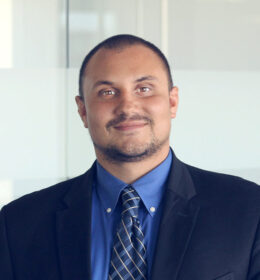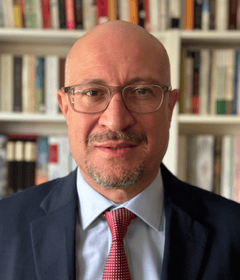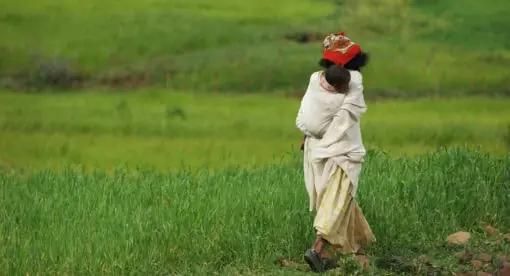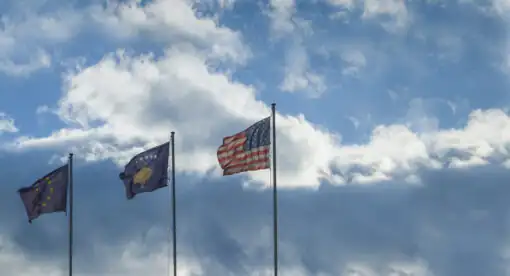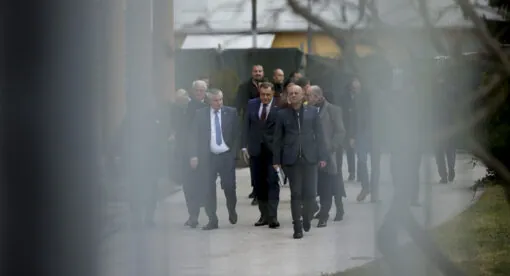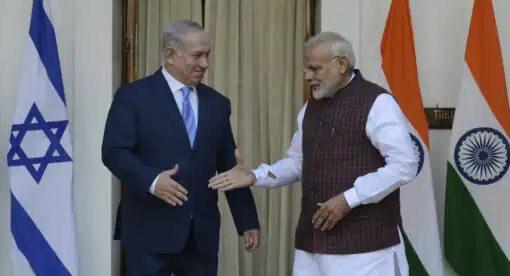In this edition of The New Lines Institute Middle East Center’s Post-Assad podcast series, New Lines Senior Director Nicholas A. Heras sits down with Senior Resident Fellow Murad Batal Shishani to analyze the opportunities and challenges for Syria after President Donald Trump’s meeting with interim Syrian President Ahmad Al Sharaa. Shishani also provides a detailed debrief on his recent trip to Syria; assesses the progress of post-Assad Syrian society, politics, and security dynamics; and explains where Sharaa might take Syria next.
Nick: Hello, and thank you for joining us for this edition of the post-Assad podcast series. My name is Nick Heras. I’m a senior director at the New Lines Institute for Strategy and Policy and the director of the Middle East Center here at the Institute. Today, I’m joined by the Center’s senior resident fellow, Murad Batal Shishani. Murad is a noted global expert on the Salafi-Jihadi movement across the world and on nonstate militant actors in the Middle East. Murad recently traveled to Syria, all across the country, where he got an in-depth, on-the-ground perspective on dynamics that are shaping post-Assad Syria and the potential for Syria’s interim president, Ahmed al-Sharaa, to stabilize the country and potentially to clear a path for prosperous Syria. Murad, thank you for joining us for today’s discussion. Murad, I want to begin by asking you, what is the state of play in the country right now?
Murad: Nicholas, it was very interesting trip to me to start with. My latest or my last time I was in Damascus was in 1993. That’s two years after the collapse of the Soviet Union in a socialist republic. I was a young teenager at that time, but that struck me very strongly that the city hasn’t been changed all these years. That raised many questions. Damascus is one of the oldest cities in the world. I have this habit I developed during the last few years that I run in each city I travel to. I run through the Umayyad Square, which where the announcement of the collapse of Assad regime was announced on the 8th of December last year. Then I run through to Al-Marjeh Square where Israel’s spy, Cohen, in the 1960s was hung. Then I turned around to the Al-Hijaz Palace with the old place of Damascus.
What I’m trying to say here, there is a sociopolitical story to tell in Damascus. I think that would be attracting tourists from different places to see this old city in this sense because it has a nice story to tell. However, it tells us two things. First, that’s the previous regime, al-Assad regime, hasn’t done much to its own country regarding services and regarding bad infrastructure. That’s if you compare to another Ba’athist regime like Saddam Hussein, for instance. Yes, Iraq is better than Syria. However, it was very well developed compared to this country. Secondly, you see that that’s the major issue that people have seen are waiting to solve. The economy and how their lives will be improved after the fall of the Assad regime now with the newcomers, with the new rulers.
I’ve noticed one thing, that people are very hopeful. They are just clinging on that they call this victory. They want to let it go. Even if there is any conflict or potential for a conflict, so people oppose it, they want this to carry on. They want a functioning state. That was very astonishing. However, there was a huge loads of challenges that were waiting for this country.
Nick: I want to pull on that thread. Murad, you are a gifted storyteller throughout your career. If you were going to characterize the mood in Damascus for us, what would it be? Then I want to ask you, you had the opportunity to travel across the country, how would you compare Damascus to the other areas of Syria that you saw during your journey?
Murad: Nick, that was two days after the historic encounter between President Donald Trump and President Ahmed Sharaa in Riyadh and lifting the sanctions, which was a huge demand among all Syrians, I would say, among most of Syrians. People were looking for anything to celebrate, I would say. You will find them at Umayyad Square just celebrating, honking with their cars, just circling around because they feeling now it’s the moment to celebrate at that time. However, the challenges structure of the outskirts really, really still deep.
As you mentioned, I traveled to Homs for instance. Homs, especially its downtown and outskirts of Homs is one of the hugely destroyed areas from the previous regime, from the Hezbollah, which were just fighting in Lebanese Hezbollah in Homs, as well as Iranian former, what they called at that time, advisors, but there was a military involvement. If you look, for instance, in the downtown of Homs, you will notice that a militia done-destructions in a sense. It’s not systematic. If you go to Al-Waer on the outskirts of the city where the rebels at that time moved there, you will find a systematic destruction for all these huge Soviet-style blocks. Although they are modern, unlike in Damascus.
You will see also in Homs, where is the sectarian tension is high. It’s one of the areas where the sectarian tension happened, and it’s a possibility to happen again, as there are Alawites living there alongside Sunnis. You will feel the mood is just people are waiting. The economic challenge is the biggest, yes, I would say. Also, there is a fear of anything could just slip into a civil war. That’s the worst-case scenario. People are worried about it, and they don’t want to go to that path.
Nick: No, that makes total sense. After a horrific, catastrophic, decade-long civil war and over a half-century of just despotic rule, you can see that there is a lot of hopeful optimism among Syrians, both inside the country, but also among the Syrian diaspora throughout the world. That moment that you talk about, you have this unique experience to be able to be in Damascus after this historic meeting between U.S. President Donald Trump and Syrian Interim President al-Sharaa. I can tell you here in Washington, as these events were unfolding, there are a lot of question marks really, Murad, about, “Okay, where do we go now?”
We know that based on the actions that the US government has taken since that historic meeting between Trump and al-Sharaa that the Trump administration has essentially given Syria a six-month window, potentially longer than that, just to prove it, to prove what it’s got, to prove its ability to stabilize the country, to offer a pathway for investment in a positive way, and to work with especially the West on certain core issues, such as dealing with foreign fighters, such as dealing with the relationship between minorities and the majority Sunni and Arab population of the country. I want to ask you, of these different threads in the newly woven relationship between the United States and the new government in Syria, which do you see as the comparatively easiest to bind? What could be the most difficult to bind in this new era that we’re in?
Murad: Yes, you’re absolutely right. Loads of questions have been asked since then, especially in D.C. and the West in general. The easiest to start with is the paving the road for investments and businesses. That’s ongoing. You walk down in one of the biggest hotels, the Sheraton, for instance, which usually in Damascus was famous for hosting concerts and songs, and also having U.N. delegations in a different than the last two decades. However, it’s before that, the Palestinian factions and all the politics of Syria usually goes through the Sheraton. Today, you will find businessmen wandering around having meetings in the lobby. There is a route of going towards this. That might be the easiest. Also, we’ve noticed that Americans and Syrians reached a sort of deal regarding the foreign fighters. Syrians are saying they are integrating many of them in their own army and security apparatuses. It seems they’ve given Americans guarantees and Americans are happy. This is also one of the issues that we’re just dangling around.
There are the minorities issue. Minority is still an issue because in al-Sahel, the Alawites, these al-Assad family who originated from them, they’re feeling threatened after a few weeks ago because of the clashes happened as a previous regime militants launched attacks against the new rulers in Syria and their authorities. Also, you have the Kurds question, which you are an expert in it. Still, Kurds have reached a deal with Ahmed al-Sharaa. However, it hasn’t been translated into a practical steps how these three standing hanging issues will be solved. As well as we have Druze in the south that’s divided, and they are looking into solution and status for themselves. They are divided in a way or another.
However, this leads to the biggest challenge, how the new rulers will rule this country. That’s the main issue. Here I have a few observations I would like to say. Now, first to start with, we are seeing for the first time in Arab history, a Salafi-Jihadist in power. They have been modified their ideology, they have changed, et cetera. However, as Marxists in time, as Arab nationalists, as [unintelligible 00:10:29], and other even Muslim Brotherhoods ruled in different stages of Arab contemporary history, now we have seen the Salafi-jihadist ruling.
However, we need to see that you have this charismatic leader called Ahmed al-Sharaa, the Interim President, who carries this legitimacy of being the man who toppled them. It’s a huge. Also, I’ve seen a sort of acceptance approval among Syrians for him, however, but the majority there are critical voices. That could lead to– because if you look to the Arab neighboring in the region, that a diverse democratic system might not be the solution. We might have an autocrat leader, which depends on the local politics, how that might be pushed not to slip into an Assad-style regime, which is there are few elements on the ground that makes that so difficult to happen in Syria these days.
Also, the acceptance and approval of regional and international community plays a role in against slipping the regime into that. However, he will be facing a problem with his mates, with his brothers-in-arms, those the second-layer of fighters, those who are coming from this ideology, the hardcore. They are expecting, in return, expecting ideological, political, all these gains in return, how he will be dealing with them. Today, Ahmed al-Sharaa is ruling through a troika, I would say. Ahmed al-Sharaa, Asaad al-Shaibani, the foreign minister, as well as Anas Khattab, who is the security and the interior minister. This will supported with two figures: Mazhar al-Wais, who is the justice minister, and Abd al-Rahim Atoun, who is a part of or a member of the Al-Fatwa-Al-Iftar Consolation Council. Those two giving the ideological guidance, if you like, and we are seeing a change among them.
However, how this relation will last, the troika, how long it can last, if they have any kind of difference? Why I’m saying that is because until now, we don’t have channels and channels to manage the political conflicts if they happen. I’m talking about the institutions, the parliament, if you like, the political parties, and on the grassroots-level movements. All these haven’t been organized yet, and that gives us indication that Al-Assad will be like any other Arab regime, if you like, just a one-man show using some journalistic jargon.
Nick: Murad, thank you for this vivid description of this political dynamic at the highest level in Damascus. It’s very interesting. Your expertise on tracking the history and development of the Salafi-Jihadi movement, as well as other types of non-state militant actors. I think really it’s interesting here that we, as you pointed out, you have for the first time in modern Arab history, modern Middle East history, this modern Arab history, this Salafi-Jihadi organization that moderates along the lines of some of the theorists of al-Qaeda, that found a way to embed itself into the local sociopolitics, especially in Idlib and some other areas in northwest Syria, and then was able to claim a vanguard, or if you will, tip-of-the-spear place that pierced the heart of the former Assad regime.
One of the dynamics that I’ve been looking very closely at, I know you have as well as I have others here at New Lines, is exactly what you’ve pointed out is, how does the Syrian interim government consolidate its key lines of power? You mentioned the troika. I think the troika is a very apt description, because the sense that you get from the outside or the sense that you get when you debrief people who are Syrians coming back from Syria, going back and forth to Syria, or experts like yourself who are in the region who go to Syria, is that because it’s so early, we’re in such an incipient stage of what was former rebel rule, now here in Syria, there’s a lot of questions as to whether or not this new, we’ll call it inner regime can consolidate itself. You point to these different stress factors with its state resilience. One of the largest potential stress factors is exactly this, is the development of an active civil society within Syria along various different lines that can apply pressure on it from the bottom up. Syrians are very sophisticated, again, their message out to the world. This is one of the great skills that the Syrians both inside Syria and the diaspora have been able to develop over the last two decades is the ability to communicate to the outside world. They’re genius at it. One of the best examples in our current modern history, global history of how do you get messages out? I think this is a really interesting dynamic.
The other dynamic that I want to ask you about is Syria’s always been a country of its regions. Throughout its modern history, there have been attempts from the center, whether it was to Damascus or Aleppo, to impose a kind of order on Syria in all Syria’s different regions. Of course, as the civil war unfolded, Syria went back to being a country of its regions in a very, very major way. The impression that you get from some analysts here in the IC in Washington is that you have a particular vanguard, in this case, HTS and its fellow travelers, that took advantage of a moment of collapse in the Assad regime to build a new order, but that because the country itself is still in its regions from civil war, that that new order in Damascus essentially controls Damascus and Idlib. Everywhere else it has to, still in a way, fake it till it makes it.
The meeting between Sharaa and Trump was important, but there’s still a lot of work to do. That actually in fact, the liberalization of Syria’s economy where you have potentially a lot of money inflowing like a thousand flower blooms of different personalities could actually in some ways threaten the inner regime if it doesn’t find a way to centrally manage flow money, whether it’s humanitarian assistance and a rentier model in that context, or whether it also private investment in the country and has its hand in that as well.
Want to ask you, and you mentioned this, so you have the threat to Sharaa from his Salafi-Jihadi fellow travelers, the idea that he could potentially be ended in a suicide bombing from one of his fellow travelers, so to speak, as it was put to me by someone here in the IC in D.C., but also this idea of how does he represent a palatable and acceptable form of governance for the broadest range of Syrians? These two tension points on the regime. I wanted to ask you, based on your experiences on the ground in Syria in different places, how does Sharaa begin to try to, if you will, coup-proof this new regime from both those factors?
Murad: That’s very interesting. To start with, the economical factor would be very interesting to watch because I think the challenge is more technical than political in a sense that needs — each 10,000 lira equals $1. If you want to grab coffee, you need a lot of banknotes to carry with you. Even small shops there, they have this machine that counting the money, this kind of thing. Everywhere you turn around, you will find that. Also there is no credit cards, debit cards, all these are not working. The banking system needs to re-innovate, if you like, recreate, and that will take few time. I think there will be very much investors trying to involve.
However, the second part, the stresses regarding the political and how the — now there is a debate about the society, about “Idlibization” of Damascus and these people coming from outskirts, and usually Damascus has its own old traditions in ruling the country, as they put it. Although al-Assad lasted for about 60 years.
Al-assad family were from outskirts, they were from rural areas. They came and they start to call it ruralization of the urbans, if you like. That’s debatable.
Your observation is correct. If you go outskirts of Damascus, you will see the security situation is fluid, I would say. That’s the challenge, how al-Sharaa trying to consolidate his power through giving the upper hand, organizing the public security. That means he needs also to please different factions who’ve been with him through this battle. That’s the big challenge. Also, it needs loads of money to support these kind of apparatuses. Now, there are promises from countries like Saudi Arabia and, to a lesser extent, the United Arab Emirates to support these efforts. However, if you look at the security apparatus, there is also a challenge regarding the army itself, and there is the Israeli question. Israelis have been intervening inside Syria in the last few months, where they’re shelling certain areas and advancing towards the borders of Syria, especially in the south. This is a big challenge, how al-Sharaa will deal with it in front of the international community and in front of his brothers-in-arms [unintelligible 00:20:42], if you like. That’s also the big challenge that will be put across among al-Sharaa.
Al-Sharaa now needs to enhance his legitimacy inside Damascus. That’s what he did, to always remind people that he’s originated from Damascus and he’s al-Mazza. Al-Mazza is an affluent neighborhood, affluent in a sense with a conservative religion, a Soviet-style blocks of buildings. I’ve been there, by the way. On the western side of it, there were Iranian advisors who left after the fall of al-Assad regime. All these nice apartments being taken by the new rulers. There in on the western side of al-Mazza neighborhood where al-Sharaa originated. His effort to enhance his legitimacy towards reminding people he’s from Damascus, that’s one of the efforts he’s taking to build around him this the social group, social movement, or social origins that support his legitimacy.
Also, he will be pressing on the spreading the security all over other places, that’s a big challenge. Also, there is a big challenge regarding the infrastructure. The road from Damascus to Homs, for instance, 180 kilometers, there’s not even one pole for the electricity or lightbulbs all the way there. It was very scary to commute in the night there. All these challenges, people want development and they want to be engaging in development as well as in Idlib and in Damascus, and not leaving them side.
Having that said, you have people are armed, people are frustrated. Yes, they are hopeful, however, they are frustrated. They will be looking closely to how al-Sharaa will be responding to their demands. It’s notable, these days are Eid, the bigger Eid [unintelligible 00:22:52] Muslims. There were the new rulers, for instance, the mayor of Damascus was just wandering in the streets, congratulating people and giving them what they call an Eidi, that’s a small amount of money being given in a huge way for young people. He was just wandering and giving them. These Santa Claus policies, they won’t work. Temporarily, they can gain legitimacy, but people are looking for more and more, and they won’t function in Syria. .
Nick: This is very interesting because one dynamic that has piqued my interest when I hear discuss Syria with different folks working in the IC or working on these issues in the policy level here in Washington, is this idea of the potential for a second revolution to emerge. You saw after a preview of that when Secretary of State Marco Rubio testified to Congress that it was the assessment of the U.S. government, that without the United States making the bold move that he did, that they have done with sanctions relief and with President Trump’s visit as, if you will, a big symbolic gesture of a turn of the page to a new era between the United States and Syria, that, fundamentally, all the conditions are there on the ground. We’re not even talking about the autonomous region of northeast Syria. We’re not even talking about the Sahel. We’re not even talking about Suwayda, we’re literally just talking about that core area of central western Syria that, nominally, the new government in Damascus has writ over. That there’s this potential for a “second revolution,” perhaps not armed as such, but an uprising of intellectuals and just common people, everyday people, for exactly the reasons you outlined.
Frustration with the imposition of a potentially new order that might not fall to the depths of, say, the previous horrendous Assad regime, but would have a type of strong authoritarian grip over the country. The closing off of some of the possibilities that people you saw were really just excited over after the fall of Assad late last year and early this year. The potential for the economy, even with all the investment and humanitarian assistance essentially flowing, not recovering because the scale of the destruction and these underlying structural issues.
I want to ask you, in terms of this concept of the potential for a second revolution in Syria, from your observations and from your forecasting, what would that look like, and what are some of the steps that need to be taken in these next six months in the first window of opportunity for the new government in Damascus to forestall that possibility?
Murad: I would doubt there will be a second revolution in a sense. Why is that? I would say those two started the civil society, the elements in the grassroots level, those who’ve been initiated, if you like, the Syrian revolution, those who’ve been very vocal and active since this started in Daraa and spread all over Syria 14 years ago, they are disorganized, I would say. They are very tired. Also, l, some of them have been taken and accepted al-Sharaa presidency, if you like, his leadership.
I’ve met some people who used to oppose during the revolution, but they are talking in a very romantic way about him, about things. Creating this image, this charisma, it’s widespread even among intellectuals. First thing because of they are disorganized, secondly, because they are divided, I would be really surprised that there will be an organized effort towards that.
However, these are very important elements to be considered as if to reduce the absolute power that might come in the hands of al-Sharaa. Which will be very important this grassroots level to be helped, if you like, and to be organized in a sense that could be playing a major role in running their country, and by diversity, with their different opinions. That’s all pooling to the country. That not suggesting any kind of policy intervention in Syria and how they run their country. That said, it’s very important to have a functioning state that could last and could surpass the situation it has.
Yes, you’re right, there is a fragile situation. I doubt there will be a second revolution. However, civil war is still a threat and a nightmare to Syria. That’s ringing around the country. Although I exclude the second revolution, but I don’t exclude the worst-case scenario, a civil war, in a sense. As I said, the situation is fluid and fragile as it is. Therefore, I doubt there will be a second revolution in a sense. However, I think eventually the civil society in Syria, different groups, political, social, economic groups, will think that it’s the best way to go and gather and organize themselves.
What to do next? I think the thing is, there should be channels inside Syria these days in a political regime to handle and to manage the political conflicts. Therefore, there should be started with immediate urgency, I would say, to have institutions. There should be local political parties, there should be a law paving the road for a parliament.
There should be a law that managing the unions, in a sense, with extent of freedom. For instance, I was talking about journalists, they were telling me they were not even allowed to talk about journalism, even in the universities. Now, there is a potential you can have a very strong union of journalism. You can have unions or a different kind of sectors that will help that running the country. Institutionalize this presence of a functioning state. It will be a more urgent step that we take.
Nick: I want to ask you, Murad, about you mentioned this horrific possibility of another civil war breaking out in Syria. One area of analysis that has in some ways lost focus over the last half decade is the ISIS element. As we know, ISIS and Jabhat al-Nusra fought essentially a civil war within the Salafi-Jihadi circles in Syria, in which ISIS won most of those battles and displaced Jabhat al-Nusra from large areas of central and eastern Syria to where it had to reconsolidate and rebrand itself. Throughout the last half-decade or so, since the territorial caliphate of ISIS was declared defeated in Syria. There has been an attempt by ISIS to maintain its force structure and its activities in what had been formerly the Assad and ally control areas of central and eastern Syria.
My understanding from contacts on the ground is that region of Syria is in many ways still extremely unsettled, still open to many different lines of influence, whether it’s from the al-Hashd al-Shaabi on the Iraqi side of the border, whether it’s local militias that were organized by the Iranians and Assad in areas of Deir ez-Zor, whether it’s sleeper cells of ISIS, local militias, some of them tribally organized or otherwise, and just a general sense of something potentially vicious, if you will, stirring under the water.
I want to ask you, as an expert in the Salafi-jihadi movement, its history, its various different forms, if we were to try to forecast the playbook through which ISIS would try to reassert itself in Syria, confront al-Sharaa, that government, what would that be?
Murad: This is a very interesting question, Nick. I have been following ISIS statements and publications lately since the fall of al-Assad regime. The first thing they started to implement, they went to disseminate, was that to discredit al-Sharaa, saying he is just a hypocrite, he is just joining the Western efforts. Even this division is among his previous allies. For instance, the famous ideologue of Salafi-J
ihadist Abu Muhammad Maqdisi, although he opposing ISIS as well, but he issued a statement even reaching to excommunicating al-Sharaa.
What I’m trying to say that there is a division even among jihadists themselves. This division could slip into al-Sharaa, a solidarity group or the group close to him. That is understood very clearly by ISIS. If you look to their latest statements, they were just inviting foreign fighters, for instance, to join them instead of joining al-Sharaa or leaving al-Sharaa. Also, they will be discrediting al-Sharaa and his regime, and saying it’s a Western project, describing him as a hypocrite.
The third thing they are aiming to do is to create this narrative that will make the ground easier for them to recruit more. ISIS problem nowadays is the lack of networks in Syria and Iraq. Their networks have been hit hard since 2017 by the international coalition against ISIS, but the ideology is still there. Any time they can start to recreate this network, that makes their efforts towards toppling or confronting al-Sharaa will be essential, very important to them.
Before that, I need to mention one thing that the internal links between jihadists themselves or Islamists between themselves were very brutal and very fierce. You mentioned that correctly in the previous times when ISIS won over al-Nusra in many fronts. Like I said, there are loads of examples from similar examples but the internal rifts are very fierce among them. That’s why ISIS will be looking forward to re-create their networks and launch attacks.
Although al-Sharaa and his mates will understand how they work and the modus operandi, and I’ve heard some people from internal circles talking about that security is our game, so they are just on control, on top of things. We’ve been hearing chapters that even ISIS, who started to operate in Africa and Afghanistan, rethinking to repush their operatives, their ideology back to the Arab world, which, as we know, that the jihadist movement always been Arab-oriented, structurally Arab. They are more interested.
We’ve seen that, for instance, after Chechnya war, which I followed closely, after the American invasion of Iraq 2003, start people to flock back to the Arab world. It happened before, even when they were in Tajikistan, before that, they started to go back. ISIS will be and is thinking seriously to confront al-Nusra project, to confront Tahrir al-Sham, the new rulers of Syria. They will be playing to create the ideological underground tools so they can attract more recruits to their ideology.
Nick: Murad, I want to end our discussion with a big question, I know, but if there was one big idea that you’d want policymakers here in Washington D.C., to take away from this discussion to shape how they view, let’s say, the next six months in Syria, based on your experience on the ground in Syria, what would that big idea be?
Murad: Building the institutions, institutions, institutions. Supporting al-Sharaa regime for the new political system in Syria should be just running around building the political institutions and paving the road to have a healthy political life, even if it wasn’t up to the what people are looking forward to have a really, fully democratic state, which we don’t have in the region so far. However, that’s what I would say, if I were to take out of this, creating or building the institutions will be the step one in the next six months for Syria.
Nick: Thank you very much, Murad, for joining us for today’s discussion on Syria.
Murad: Thank you very much, Nick. It’s been a pleasure talking to you.
Nick: Thank you, everyone, for joining us for this discussion. We at the New Lines Institute will continue to keep a close eye on developments in post-Assad Syria as the Syrians chart the new course of their future. Thank you, and all the best.
The views expressed in this article are those of the author and not an official policy or position of New Lines Institute.

